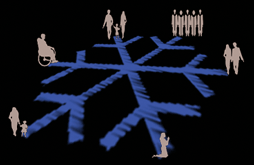 |
Computational
Sociology |
REQUIREMENTS ON COMPUTATIONAL SOCIOLOGY RESEARCH in DEPT. COMP.SOC BFI
In social sciences, computation is generally still a new. In the evolutionary social sciences, the scientists usually use the qualitative measurements as they can only give some qualitative suggestions in return. More naively, the analysis offered by the social classical analysts are often the way to hand a metanarratives for the whole social system.
Using complexity as a knife for analysis will give the scientists a weapon not to write down a metanarratives, but to approach the social system as a selforganized localized system. We are not trying to explain the whole social system.
But we are trying to see more closely to the social system, a localized social system, that we use the methodology of quantitave sociology. Moreover, we are not trying to give the bondary between sciences anymore as naively usual. But we are standing on the interdisplinary view of sciences. This is not a social sciences an sich, as you will get usual with the Poincare Map, chaos theory, emergences, cellular automata, calculus, Dynamical System, etc. as the method has been usually done for the physical modelling system.
Distributed systems
are systems made of a collection of entities (humans, technical systems,
insects, etc.) and where decision (control) is totally or partially taken
by these entities. Often we refer to agents instead of entities when we
simulate the behaviour of real distributed systems by software. Agents
are
artificial constructs (software based) characterised by internal states
and behavioural rules. The stereotypical example of a distributed and
complex system would be a colony of ants. Without any central co-ordination
(if we suppose that nobody in a social insect colony have such organisational
power), the colony will behave in a very coherent way over centuries.
Such colonies can also show
complex social reorganisation in periods of difficulties. Structural flexibility,
fast reaction to external environment changes, robustness looks to be
the positive consequences of distributed systems.
Like neural networks,
distributed system are in many ways conceptually different from the traditional
structural approach which suppose the pre-existence of a general structure.
Distributed system theory starts from the analysis of local interactions,
formalise the relationship between individual agents and their environment
or other agents in its vicinity. Then, through the simulation of this
interaction, the model can computationally generate global behaviour.
It is a pure bottom up process by opposition to the classical analytic
approach which make hypothesis about the global structure (or invariant)
of the system and then try to validate with a top down procedure. Thus,
distributed agents encode and react to
the outside world without any global view of the system and without any
central co-ordination. The global behaviour and functionality’s of
the system emerge from the local interactions. Local learning rules allow
individual adaptation to the environment resulting in better global behaviour.
The paradigm of distributed agents has been extensively used recently in many domains such as ethology, economics, population behaviour, politics, emotions, disease transmission, etc. in order to understand better the dynamic of these systems but surprisingly has seldom been applied to cognitive science. If a system is capable of self organisation, its functions evolve over time so that they can respond better to the requests of its environment. In this sense, a complex self-organised system cannot be described as structurally stable. The whole discourses above will be the main target of knowledge that will be the focus of education on the recruitment in Bandung Fe Insitute. This is the main idea on how see the social phenomena in high-technological perspectives. By joining the educational program of graduate socio-technological education, students will be usual in the interdisciplinary discussions on the approach to the social phenomena.
As a matter of principes
in the advancement of knowledge, there is no standard pre-requisites on
educational grade will be necessary to join the courses and researches
in the program. But in order to be able get along to the program, the
student must pass the tests that made for it, in some under-graduate level
fields, such as:
1. Calculus, upto the differential equations..
2. Advanced Mathematical Engineering, including
the elementary linear
algebra, i.e.: matrices, vectors, probability and statistics, linear and
nonlinear
system analysis, real analysis.
3. Basic concepts on Sociology, including
the concept of sociology in many schools of thoughts, i.e.: Parsonian,
Dramaturgical Sociology, Conflict theory, as described in the tutorial.
4. Basic of Algorithm and Programming.
5. Logic.
6. Fundamentals of Physics, Chemistry and Biology.
7. English (TOEFL > 500)
